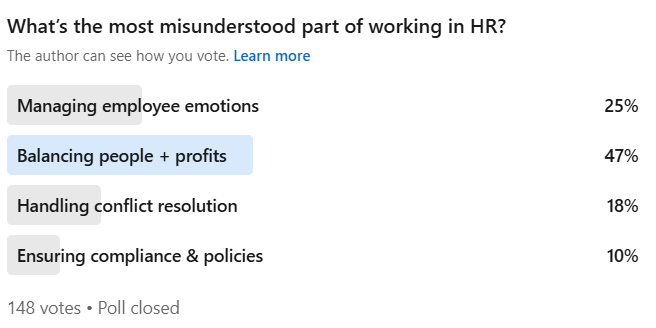
HR leaders say they struggle to balance employee priorities with the bottom line

Striking a balance between employee engagement and business performance remains the most misunderstood—and difficult—challenge for HR leaders, according to a HRD poll.
When HRD Australia asked what is the most misunderstood part of working in HR in a recent poll on our LinkedIn page, balancing people priorities with profitability was voted the toughest part of the HR role.
Of the 148 professionals who took part, 47% said voted for this issue as the most misunderstood, followed by the ability to manage employee emotions (25%), the poll results show.

HRD spoke with Daejeong Choi, Associate Professor in Human Resource Management at the University of Melbourne, who said this is a long-standing issue in the industry.
“Since around 2000, the role of HR managers became more strategic, less operational. There have been a lot of quick changes in expectations from dealing with payslips and the day-to-day running of a business, to aligning goals and strategies for commercial growth.”
Translating strategic goals into human capital outcomes remains a major hurdle, Choi said.
“Dollar values mean nothing for HR, so it can be a real challenge converting that into what it means for your people. Even in lectures, I’m teaching people how the industry’s switching to a more managerial role – because that’s what makes value to the company,” Choi added.
Choi pointed to increased collaboration with the C-suite and the impact of artificial intelligence (AI) as key drivers of HR’s shifting remit.
“The good thing about HR is that they are still managers. If it was purely operational, businesses could make the decision to outsource them or even get AI to do it. It’s really important to make sure you show value in HR practices in this modern way of working – it has to contribute to both business function and people function.”
This strategic repositioning is also reshaping career pathways in HR, Choi warned, with fewer opportunities emerging at the entry level.
“There’s a growing demand for managers, but junior HR jobs are in short supply, because businesses need to know how to manage people and not look at operating HR practices day-to-day.”
“Leaders need to be ready for change,” Choi told HRD, “because we’re seeing big transitions now. If the skills aren’t there, that can be a stressful time for businesses. That’s one of the ways why it’s so difficult to balance everything.”
Looking ahead, Choi emphasised the need for HR leaders to embrace a hybrid identity—one that integrates managerial acumen with traditional HR expertise.
“People are your biggest asset and they’re the ones that make the business money, but you’re now expected to work in managing your people instead of working with them. The manager becomes bigger than HR.”
“You need to be able to manage the business – and then use your skills in HR to utilise that for the business function, whether that’s sustainability, the environment, or governance. It’s a very slight change that blurs the lines,” Choi added.